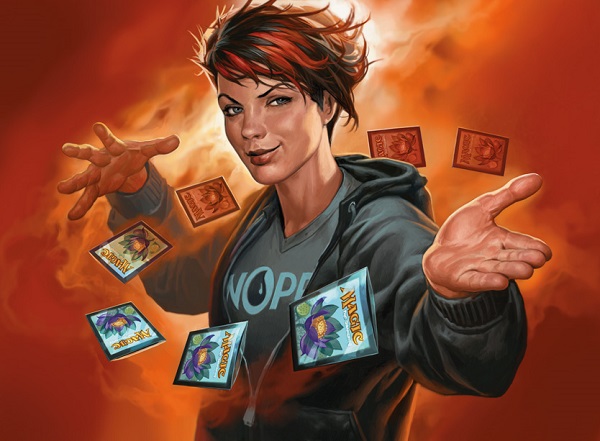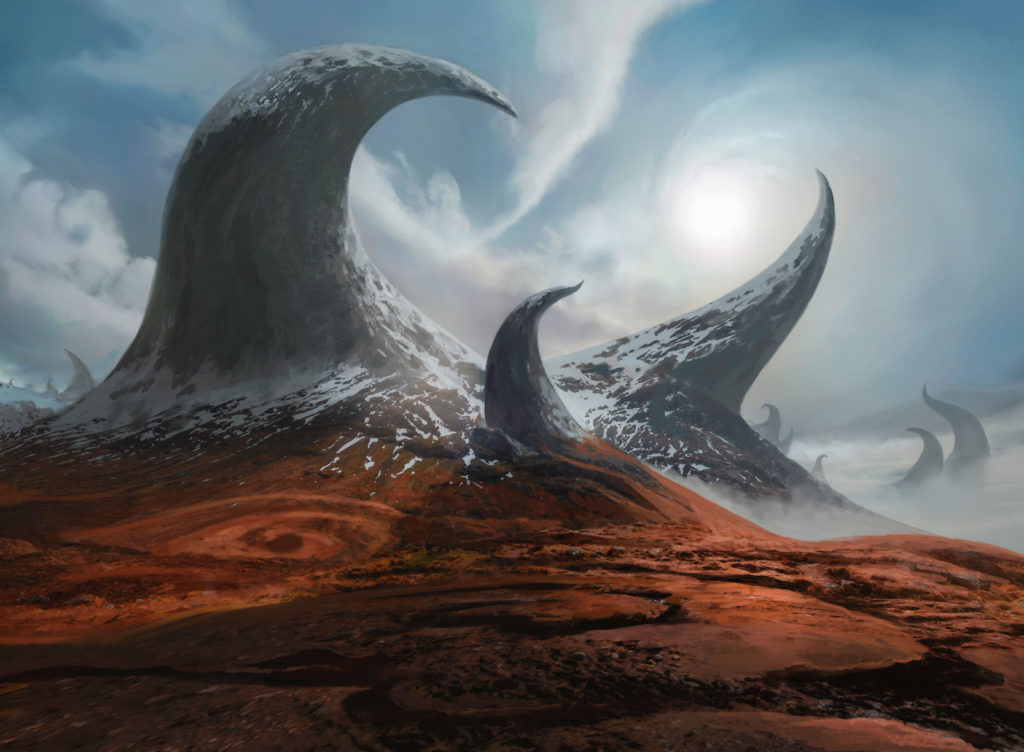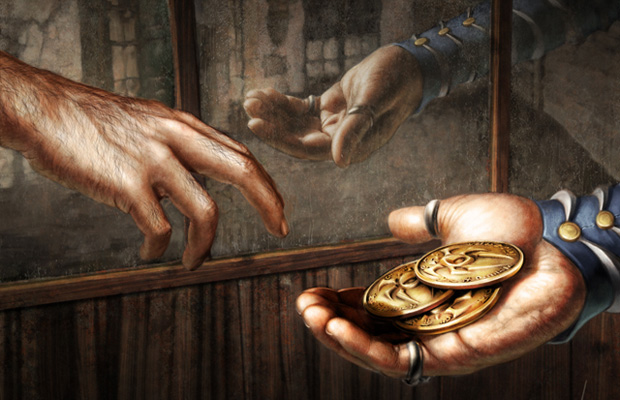Due to the Covid-19 pandemic, Magic the Gathering Arena has become the de facto home for virtually all competitive play. It’s a safe bet that the 2020-21 season will be played entirely on Arena, save for a few qualifier events held on Magic the Gathering Online. With the recent announcement of the three Zendikar Rising Qualifier Weekends something stood out to me: the format for the first weekend is Historic.
The first qualifier weekend will undoubtedly be the largest in terms of numbers of players participating. The event is being held on September 12th and 13th, less than a month from now, and will invite all of the top 1,200 ranked constructed and limited players from the June, July, and August 2020 ranked seasons on MTG Arena.
Arena only currently supports two constructed formats that feature ranked ladder play: Standard and Historic. Its likely that most of the players in the event will be familiar with Historic, but it’s a safer bet that the vast majority attained their Mythic ranking by playing Standard or Limited. We’ve yet to see a major Limited event on MTG Arena so Wizards choices are Standard and Historic. Since we know they would probably prefer not to feature Standard exclusively—that’s been a bad decision in the past and all of the recently banned cards would not bode well—it isn’t a surprise that Historic is being featured.
However, I think there is still some validity in questioning whether Historic should actually be considered for esports events. Wizards of the Coast has chosen it for several events now, and while Standard may not be in the best shape ever, I don’t know that Historic makes sense as a selection. There are pros and cons to featuring Historic and I’ll address what I believe are the three most important factors in this decision: fan engagement, product showcase, and financial burden.
Fan Engagement

Let’s start with the most important reason for the existence of esports: fan engagement. After all, what’s the point if there isn’t an audience? I think that Historic is not an ideal format for fostering fan engagement especially when compared to Standard. It’s a fun format, don’t get me wrong, but it isn’t nearly as widespread as Standard.
An important question to consider when discussing whether or not a format resonates with your fans is whether or not your fans even play that format. With Standard it’s usually safe to assume yes. With Historic, I think it’s safe to assume the opposite. You can only play Historic on MTG Arena and we know that most Magic players are in fact not using Arena as the vast majority of fans are still tabletop players.
During their Q2 financial report, Hasbro addressed concerns that Arena would siphon players away from tabletop and claimed that this is not happening, and that they continue to see growth in the tabletop area.
For me this is a huge strike against Historic as a featured format by Magic Esports. While the qualifier weekend isn’t an event that is going to have major fanfare provided by Wizards of the Coast, many streamers will be broadcasting their own play. Forcing folks into a format that their audience may not be familiar with doesn’t seem like a positive. More importantly, if Historic is featured at a marquee event like the Mythic Invitational or Grand Season Finals, it has the potential to turn viewers away.
Product Showcase

Next let’s discuss product showcasing. After all, the entirety of Magic Esports has a fairly significant objective in marketing the game and the platform to fans and viewers. Wizards is clearly aware of this when it comes to branding the competitions since they made the shift many years ago to name Split Championships (then known as Pro Tours) after the most recent Standard expansion instead of the city it’s being held in.
Aside: Good foresight on getting away from naming major events after cities ahead of the pandemic that forced you to stop holding events in physical locations!
So one of the goals of the Zendikar Rising Championship and the Split and all of the associated esports events is to showcase Zendikar Rising. That makes perfect sense, no? Okay, so Zendikar Rising comes to MTG Arena on or around September 16th and the first Zendikar Rising qualifier weekend is on September 12th.
Well that’s weird. Why not make it the following weekend?
It seems like the first qualifier weekend for Zendikar Rising will not be about Zendikar Rising at all. That’s fine, I suppose, but it also feels a bit like a missed opportunity. This depends on where you fall on the question of whether or not tournaments should feature formats that just had new sets released.
If you’re a player, then you probably don’t like it. After all there’s new cards to acquire, new decks to test, and a time crunch that can create a lot of stress. On the other hand if you’re a fan then you probably love it. Everything’s fresh, the cards are brand new, you’ve never seen these strategies before. It could make for very exciting viewership.
Wizards has a fairly consistent history of making decisions like this based on what’s best for the players, not the viewing audience; so it isn’t too surprising to see that this event is being held the weekend before the set is released.
Since Zendikar Rising isn’t being featured, it makes sense that Historic would be chosen instead of Standard. Not only is the new expansion not available in time, but half of the cards in Standard are rotating out a few days later. Considering the product showcase factor, the decision to go with Historic instead of Standard makes sense.
Player Burden

Lastly we come to the financial burden placed on players. As noted above, one of the reasons we tend not to see tournaments, especially major ones, held immediately after a set is released is because it takes time and money to acquire all of the new cards. For some players this is trivial; but for most players, especially those playing in an all-amateur level event, this could prove difficult.
So it’s a good thing Wizards isn’t giving folks something like seven days to acquire every card in a new set, test with them all, and then figure out what deck they want to play in a tournament.
Instead, Wizards is giving folks a month to acquire every card in every expansion ever released on MTG Arena including two recent expansions that both included inflated numbers of rares and mythic rares, and then they can only test with other players who have done the exact same thing. And then they can figure out what to play.
This, for me, is the biggest reason to stop Historic from being featured as a format as part of Magic Esports. With every Standard set added to Arena and every Remastered set used to bridge the gap to Pioneer, Historic will get more and more prohibitively expensive to buy into.
While I will save a discussion for wildcards vs. dust for another day, wildcards are the system we have. For Standard they aren’t too bad since Standard sets are fairly easy to collect. But for Historic they’re a nightmare.
As more cards are added to the format, like any eternal format, the metagame is going to shift, and sometimes drastically. Without a mechanism to convert no-longer-needed cards into the new hotness, players are left with only one option, buying more packs to get wildcards for the new hotness.
Until Wizards finds a way to make it somewhat more financially viable to play Historic, I think the burden on players is going to be very high, and continue to get much higher as time goes on. I hope that this one qualifier weekend is more of an anomaly than an indication of future plans.
Keep Historic on the Sidelines For Now
At a minimum, Historic should be relegated to small premiere events where players are given an account with access to every card, but even then that still goes against the first two points I made about fan engagement and product showcase (though I suppose they could be showcasing the remastered sets or historic anthologies).
Wizards has struggled with this problem for a very long time now. There was that one year where every major event was Standard and players and fans were very disappointed. However it’s important to note that Historic is not Modern; it’s not even Legacy when it comes to popularity and fan engagement. Historic isn’t a format anyone can play at their LGS or even at their kitchen table. While it may be difficult for us to live with Standard as the only competitive format until a) the pandemic ends or b) Arena properly supports Pioneer in an affordable way, I truly believe it will still be a better experience than if Historic becomes a regularly featured tournament format.
It’s clear that Arena is making significant investments in Historic as an experimental format. Thanks to Covid-19 we will probably never know whether or not Pioneer would have thrived as a format on the Grand Prix and SCG circuits, as an alternative to Modern, a format that is increasingly more and more difficult to buy into.
When Arena first launched, Wizards of the Coast was very coy about the idea of adding support for formats like Modern and Legacy. They were clearly trying not to raise too much attention to the death knell that’s been chiming for Magic Online ever since Arena was announced. But now with Historic being somewhat successful and giving way to Pioneer being brought to the platform, one has to wonder what the actual end goal here is.
After all, there are cards in Historic that are not in Pioneer such as Mirari’s Wake and Phyrexian Arena, and there are cards that define the Historic metagame that are banned in Pioneer such as Field of the Dead and Kethis, the Hidden Hand.
All of this points to a format without clear direction. At first Historic needed to exist because Wizards decided not to let players cash in rotating cards for in-game currency. So Historic was born from necessity not by design (fun fact: when Historic was announced Wizards tried to make crafting cards cost 2x wildcards).
The Historic Anthologies certainly bring into question whether or not Pioneer was always the plan (it almost certainly wasn’t) and it could explain why Historic Anthology 4 has been pushed off so far from the previous ones. It gives Wizards time to rethink their overall strategy with Historic once they compare the anthologies to more recent releases: Jumpstart and Amonkhet Remastered.
Those two sets also bring into question just what is going on with the Historic-to-Pioneer plan. Muxus, Goblin Grandee for example, is a key component in Historic Goblins, but it isn’t Pioneer or even Modern legal. What happens when Historic and Pioneer finally merge into one format? Will paper copies of Jumpstart cards suddenly become Pioneer legal? Will they all be banned from Historic on Arena?
Historic is an experimental format. As such, I would be very cautious of Wizards of the Coast trotting it out as a featured esports format. For all of the problems they’ve had with balancing cards in Standard for the past couple of years, Standard is still the most-played format and the one that is likely to generate the most fan engagement while showing off the latest products.
Putting Historic front-and-center is going to expose all of the inherent problems in the format as well as Wizards of the Coast’s lack of a cohesive plan for Historic’s future.

